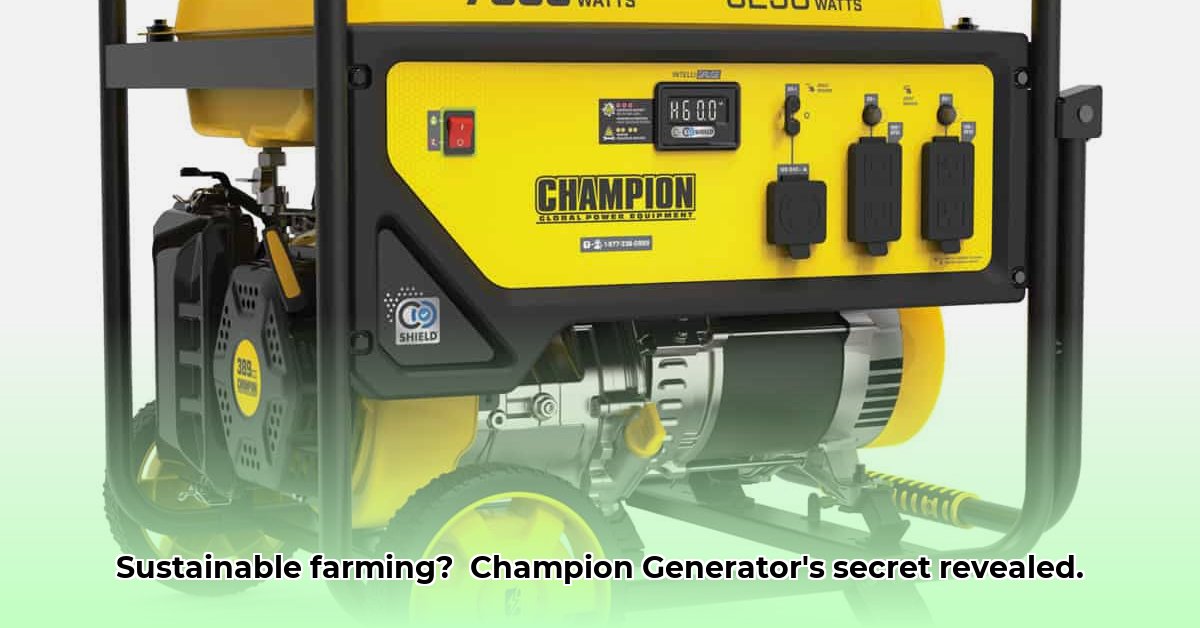
Power outages can cripple a farm, leading to crop loss and financial ruin. A reliable backup generator is essential for maintaining operations. Champion generators, widely available at Tractor Supply, offer a robust solution, but sustainable farming demands careful consideration of their environmental impact. To find out more about generator availability, check Tractor Supply generators. This guide provides actionable steps to select, maintain, and utilize Champion generators responsibly, minimizing their environmental footprint while ensuring farm resilience.
Choosing the Right Champion Generator: Optimizing Power and Efficiency
Selecting the correct generator is paramount. Tractor Supply offers various Champion models, each suited to different power demands. Before purchasing, assess your farm’s energy needs. What equipment requires backup power? Will you run multiple devices simultaneously?
Key Considerations:
- Wattage: Determine the total wattage of all devices you'll power simultaneously. Choose a generator with a higher wattage rating to avoid overloading. (Wattage: a measure of electrical power)
- Run Time: Consider the typical duration of power outages in your area. Select a generator with sufficient run time on a full tank of fuel.
- Fuel Efficiency: Champion's inverter generators offer superior fuel efficiency compared to conventional models, reducing fuel consumption and emissions. (Inverter generator: a generator that produces cleaner, more stable power.)
- Noise Level: Inverter generators are significantly quieter, minimizing noise pollution. Consider the location of the generator to avoid disturbing neighbors or livestock.
Maintaining Your Champion Generator: A Guide to Longevity and Efficiency
Regular maintenance is crucial for extending the lifespan of your generator, improving fuel efficiency, and reducing emissions.
Essential Maintenance Steps:
- Oil Changes: Follow the manufacturer's recommendations for oil changes to maintain optimal engine performance and reduce wear. (Oil change frequency varies depending on usage).
- Air Filter Cleaning: A clean air filter ensures proper combustion, improving fuel efficiency and reducing emissions. Clean or replace the filter as needed.
- Spark Plug Inspection: Regularly inspect and replace the spark plug as necessary. A faulty spark plug reduces efficiency and increases emissions.
- Fuel System Care: Use fresh, clean fuel and avoid storing gasoline for extended periods. Old fuel can contaminate the system and damage the engine.
- Proper Storage: When not in use, store your generator in a dry, protected location to prevent corrosion and damage.
Champion Generators: A Cost-Benefit Analysis for Sustainable Farming
Champion generators offer several advantages; however, certain drawbacks must also be acknowledged. A balanced perspective is necessary for informed decision-making.
| Feature | Advantages | Disadvantages |
|---|---|---|
| Power Output | Reliable backup power during outages. | Limited power output compared to larger, stationary generators. |
| Portability | Easy to transport and position around the farm. | May be insufficient for very large-scale operations. |
| Fuel Efficiency | Inverter models offer high fuel efficiency, reducing operational costs. | Still relies on fossil fuels, leading to greenhouse gas emissions. |
| Noise Level | Inverter models are relatively quiet. | Some noise is unavoidable with generator operation. |
| Cost | Various models cater to different budgets. | Requires an initial financial investment. |
| Availability | Readily available at Tractor Supply stores nationwide. | Transportation to remote locations might be necessary. |
Sustainable Farming and Generator Use: Minimizing Environmental Impact
Minimizing the environmental impact of generator use is crucial for sustainable farming. While generators provide essential backup power, responsible use and a long-term strategy are vital.
Strategies for Sustainable Generator Use:
- Optimize Generator Use: Avoid unnecessary idling. Only run the generator when absolutely necessary.
- Fuel Selection: Consider using cleaner-burning fuels like propane or natural gas whenever possible.
- Renewable Energy Integration: Explore integrating renewable energy sources such as solar or wind power to reduce your reliance on generators. This reduces your carbon footprint and enhances overall sustainability.
- Maintenance: Regular maintenance maximizes fuel efficiency and reduces emissions.
- Emission Control Technologies: Modern generators often incorporate emission control systems. Proper maintenance of these systems is vital for minimizing emissions.
Prioritize energy efficiency on your farm through irrigation improvements and efficient equipment. Reducing overall energy demand lowers your generator's usage, thus contributing to sustainability. Integrating renewables is a long-term strategy to minimize carbon emissions and ultimately limit the reliance on backup generators.
Key Takeaways: Champion generators offer valuable backup power for farms, but sustainable practices are essential. Careful selection, regular maintenance, and mindful operation minimize environmental impact, aligning with sustainable farming goals. Investing in renewable energy options is a key element of long-term sustainability.